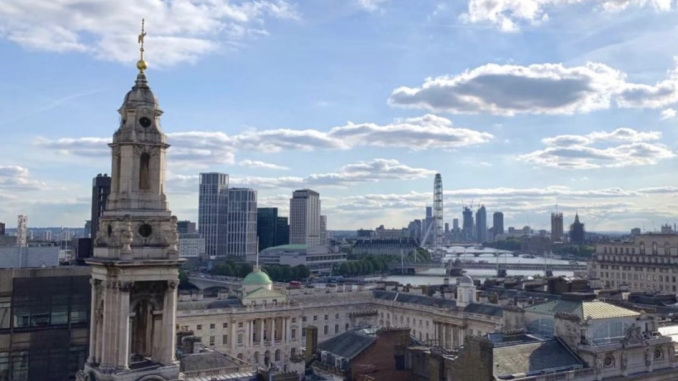
Written by Jake Fletcher.
The BA(Hons) Liberal Arts course at King’s is perfect for a student searching for something that is intellectually challenging and stimulating. One of the first modules that Liberal Arts students take is Lives of London. The classes are taught on Strand Campus, in the heart of London, so it’s fitting that the first core module of the Liberal Arts course tackles issues relating to the capital. In this blog post, I’ll talk through this first year module and some of its key characteristics!
For the first few weeks, you attend lectures with the rest of your year group. For my first lecture, I distinctly remember the sounds of London Calling, recorded by the punk band, the Clash, opening the class. I was definitely intrigued – the Clash never got played in our sixth-form classes, never mind analysed. The class set a precedent for discussing London critically, rather than descriptively. Lives of London introduces students to looking at case studies beyond the standard descriptors, particularly in relation to class, hierarchy and power.
The module is interdisciplinary, drawing upon issues from all the major subject disciplines. In the first half of the module, we split into seminar groups to look at pieces of poetry, essays, images and films about specific sites in London and London’s history. Each week, we had seminar sessions with about 15 other students led by a member of the Liberal Arts team. I remember watching Julien Temple’s ‘London – The Modern Babylon’ as a year group in the Liberal Arts common room. Another key text that we looked at was Foucault’s ‘Archaeology of Knowledge’. Foucault argues (shortened for this blog) that there are prevailing historical narratives that are widely accepted (total history), whereas there are many other historical narratives, from the perspective of groups that are dismissed or ignored in historical canon (general history). Lives of London embraces this ethos and examines it, looking at the history and current state of London.
In this module, you visit many sites across London that you analyse in your seminar classes. Our whole year visited the Turbine Hall in TATE Modern. My seminar group also visited the London Transport Museum, although other seminar groups visited other locations in London. We had to write an essay about an object, picture or film that we found in the museum. We were encouraged to look for hidden narratives in everyday objects in London. These visits encouraged us to start thinking about the city around us, and the way these narratives all interact.
For the second half of the module, you split off into different strands and focuses. This included (from my year) Gentrification and the Public. I was asked to explore infrastructure. These issues had different focuses, but were broad enough to encompass a wide range of topics. In particular, my seminar class looked at the London Underground. We examined how the space is regulated and looked at the use of the Underground by buskers and advertising to question how much agency we have over public spaces. Each group had different locations to use as a case study.
In exploring these themes, we had to create an e-portfolio. An e-portfolio is located halfway between a blog post, webpage and essay/video-essay. You had creative freedom to take films, edit clips, include audio and sound files, quotations, or blocks of texts among many others. The aim of the task was to explore London in relation to your discipline, produce an argument and be able to articulate these ideas in a coherent and creative manner.
The other exciting thing about this module is that it encourages group work! When you first join the Liberal Arts course, you meet people from across the entirety of the Arts and Humanities faculty. That’s fantastic because by the end of your third year, you know people from all across the university. However, as a first semester module in your first year, this module encourages you to work with other first year Liberal Arts students, both academically but also beyond the course structure. This is really exciting when you create an e-portfolio. In my seminar class, we had a film maker and a student who recorded music from buskers and analysed it in their e-portfolio. This task encourages each group to play to their strengths, and you each learn more about your fellow group members.
Lives of London is a really fantastic opening module to the Liberal Arts course. Each year is slightly different, with each member of the Liberal Arts team bringing their specialisms to the forefront. For people who are new to the capital, you get to visit sites and museums across the capital. For those who have lived in London for their entire life, it’s a great way to re-explore the city that you are already familiar with and see in a new light. There’s always something that you haven’t seen before!

Leave a Reply